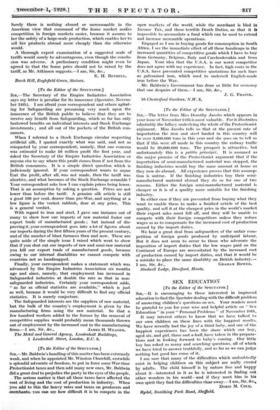[To the Editor of the SPECTATOR.] SIR,—The letter from Miss
Dorothy Jacobs which appears in your issue of November 24th is most valuable. For it illustrates admirably the fallacy underlying the whole of the Protectionist ariiiment. Miss Jacobs tells us that at' the present rate of importation the iron and steel landed in this country will be 'over 3,000,000 tons in this year and she goes on to tell us that if this 'were all made in this country the railway traffic would be 20,000,000 tons.' The prospect is attractive, but unfortunately this is a petitio principii. It is assumed as the major premise of the Protectionist argument that if the importation of semi-manufactured material was stopped, the finishing industries would buy the same amount at home as they now do abroad. All experience proves that this assump- tion is untrue. If the finishing industries buy their semi- manufactured material abroad they do so for one of two reasons. Either the foreign semi-manufactured material- is cheaper or it is of a quality more suitable for the finishing industry.
In either case if they are prevented from buying what they want to 'enable them to make a finished article of the best quality. and sell it at the cheapest price in the world's market their export sales must fall off, and they will be unable to compete with their foreign competitors unless they reduce wages so as to compensate for the increased cost of production caused by the import duties.
We hear a great deal from safeguarders of the unfair com- petition of foreign goods produced by underpaid labour. But it does not seem to occur to those who advocate the imposition of import duties that the low wages paid on the Continent of Europe are necessitated by the increased cost of production caused by import duties, and that it would be a mistake to place the same disability on British industry.—
I am, Sir, &c., GRAHAM BOWER. Studwell Lodge, Droxford, Hants.








































 Previous page
Previous page